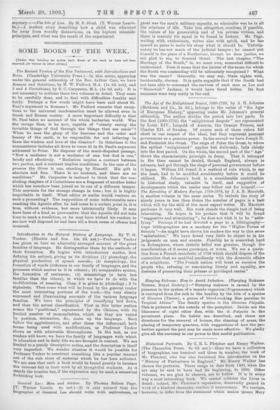SOME BOOKS OF THE WEEK.
[Under this heaaing we uotioe such Booke of the week as haus not been reserved for revieto in other forms,)
The Revised Version of the New Testament, with Introductions and Notes. (Cambridge University Proes.)—In this series, appearing under the general editorship of the Rev. Arthur Carr, we have Romans and Galatians, by H. W. Fulford, M.A. (1s. 6d. not), and 1 and 2 Corinthians, by S. C. Carpenter, MA. (1s. ad. net). It is not necessary to criticise these two volumes in detail. They seem to be carefully done, and to deal with difficulties frankly and fairly. Perhaps a few words might have been said about St. Paul's argument in Romans i. Mr. Fulford remarks that excep- tions to the universal condemnation must be allowed even in Greek and Roman society. A more important difficulty is that St. Paul takes no account of the whole barbarian world. Was the savage then, is he now, capable of "clearly seeing the invisible things of God through the thiugs that are made" P When he sees the glory of the heavens and the order and beauty of the earth, is he responsible for not inferring in them the wisdom and love of the Creator ? In Galatians ii. the commentator includes all down to verse 21 in St. Paul's argument addressed to Peter. He disposes of the much-disputed passage, "Now a mediator is not a mediator of one, but God is one," briefly and effectively. "Mediation implies a contract between two parties, and a contract implies conditions. In the case of the promise the Giver is one, standing by Himself. His gift is absolute and free. There is no contract, and there are no conditions." Mr. Carpenter is inclined to think that the con- cluding chapters of 2 Corinthians are a fragment of another letter which has somehow been joined on to one of a different temper. This accounts for the strange change in tone ; but it is highly improbable in itself. What editor or scribe would venture on such a proceeding P The supposition of some unfavourable news reaching the Apostle after he had come to a certain point is, it is true, without evidence, but more intrinsically likely. It may have been of a kind so provocative that the Apostle did not take time to mark a traneition, or he may have wished his readers to see how well disposed he had been till a fresh cause of offence had oceurred.










































 Previous page
Previous page